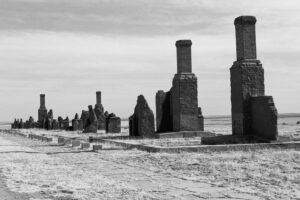
Winter Park’s Crealdé School of Art is introducing its latest project in its rich tradition of award-winning black and white documentary photography projects. “The Las Vegas Project: Contemporary Life on the Historic Santa Fe Trail in New Mexico,” artistically reveals a rich and little-known region of the Southwest, which was founded in 1835 by a Mexican land grant. The exploration of this city and culture takes a fresh look at issues of land ownership, political boundaries and immigration.
In fact, 85% of the Las Vegas population has Spanish and Mexican ancestry that predates the 1848 annexation of the Southwest by the United States. The project commemorates the 200-year anniversary of the Santa Fe Trail, an important 19th century wagon route that brought settlers and commerce to the Southwest, connecting the region’s Native and Spanish cultures with the American East coast. It is a significant and rarely explored aspect of American history.
Largely undiscovered by mass media and tourism and not to be confused with the famous gambling town in Nevada, Las Vegas, New Mexico has over 900 buildings and five districts on the National Register of Historic Places. The city is located at the foot of the beautiful Sangre de Cristo Mountains, near the final destination of the Santa Fe Trail.
The original city design resembled a traditional Spanish layout around a central plaza – which still exists today. After the arrival of the railroad in the 1880s, the city boomed and a new community was planned, built in a more Victorian-era style and located one mile from the old town, which would quickly make Las Vegas one of the largest cities in the Southwest. These distinctly different styles of two communities within one city survive until today, creating a rich environment for a documentary photography project. By the 1950s freight and passenger rail traffic declined significantly, and as a result, Las Vegas stopped growing, preserving a uniquely strong and intact architectural and cultural character.
During spring break of 2021, eight Crealdé master class students, under the guidance of seasoned Swiss-American documentary photographer Peter Schreyer, captured the stories of the places and people of this unique American region in black and white film and digital photographs, illustrating the cultural heritage and historical roots that go back hundreds of years. This program was built on the instructor’s deep knowledge of the Southwest; 35 years of conducting photographic tours; and the successful Crealdé masterclass documentaries that produced Florida-based traveling exhibitions St. Augustine at 450 in 2015 and The Lake: A Documentary Exploring the Land and People of Lake Apopka in 2017.
“The photography and collecting of oral histories are based on the approach of the great documentary photographers of the 1930s and 40s – such as Dorothea Lang, Russell Lee and Arthur Rothstein – who worked under the Works Progress Administration of the US government,” said Peter Schreyer. “It is my hope that our project will foster a deeper appreciation for America’s diverse cultures, connecting the present with the past and create a lasting visual record for the future.”
The opening event will include a presentation by the exhibition curator and project director, Peter Schreyer, and participating master class students. The exhibition text will be translated and available in Spanish.The event dates, times and location are:
In the spring, the exhibition will travel to New Mexico for an April 8th opening in the gallery at Kennedy Hall at New Mexico Highlands University in Las Vegas.


